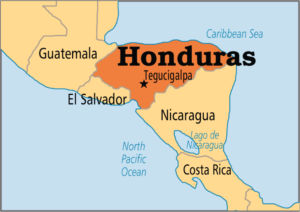CONTINUING IN THE SINS OF OUR FATHERS; A POWERFUL PROPHET FOR A CORRUPT AGE- ELIJAH; THE CROSS-CULTURAL MINISTRY OF THE GOSPEL
JUNE 16- 1 Kings 15:25-17:24; Acts 10:24-48; Psalm 134:1-3; Proverbs 17:9-11
Today’s reading focuses on the six apostate kings of Israel that follow Jeroboam and his sins:
- Nadab (Jeroboam’s son, reigns for two years, continuing the sins of his father)
- Baasha, (son of Ahijah of the house of Issachar, kills Nadab, and all the house of Jeroboam; reigns for 24 years)
- Elah (son of Baasha, reigns for 2 years)
- Zimri (commander of Elah’s chariots, murders Elah and becomes king of Israel for 7 days before burning the palace and killing himself)
- Omri (elected king by Israel’s army but half of the people followed Tibni, another claimant to the throne, the son of Ginath. Four years later, Omri becomes king and constructs the northern capital city of Samaria.)
- Ahab (son of Omri)
 Asa succeeds Abijah, son of Rehoboam, as King of the southern kingdom of Judah and is an admirable leader in many ways. He pursues reforms, attempting to return his people to fidelity to the Lord. He dares to confront the false belief systems that exist even within his own family. He removed his mother from her office as Queen Mother because of her involvement in worshipping the female fertility goddess, Asherah. In many ways, Asa serves as one exclusively devoted to the Lord, in the pattern of his great, great grandfather, David.
Asa succeeds Abijah, son of Rehoboam, as King of the southern kingdom of Judah and is an admirable leader in many ways. He pursues reforms, attempting to return his people to fidelity to the Lord. He dares to confront the false belief systems that exist even within his own family. He removed his mother from her office as Queen Mother because of her involvement in worshipping the female fertility goddess, Asherah. In many ways, Asa serves as one exclusively devoted to the Lord, in the pattern of his great, great grandfather, David.
Asa was rebuked by the Lord in a number of situations- In some instances, Asa relied more upon natural resources than God, looking first to leaders (the King of Aram -Syria; 2 Chronicles 16:7) and physicians (2 Chronicles 16:12), rather than the Lord (1 Kings 15:17-20). It is also noted that he did not remove the high places (2 Chron 15:17).
 In contrast to the ongoing spiritual reformation in Judah, wickedness and idolatry were growing worse in the northern kingdom of Israel.
In contrast to the ongoing spiritual reformation in Judah, wickedness and idolatry were growing worse in the northern kingdom of Israel.
In the north, Nadab, the son of Jeroboam, is murdered by Baasha, the son of Ahijah from the tribe of Issachar. (There are nine Ahijah’s referred to in the Bible. This is not the Shilonite prophet who addressed Jeroboam). Baasha exterminates the household of Jeroboam in fulfillment of the prophecy given by Ahijah from Shiloh (1 Kings 14:4-14).
Baasha was at war with Asa continually. The prophet Jehu predicts Baasha’s downfall and that of his household.
4 “Anyone of Baasha who dies in the city the dogs will eat, and anyone of his who dies in the field the birds of the heavens will eat.” 1 Kings 16:4 (NASB)
The fulfillment of this prophecy will be delayed one generation.
Elah, Baasha’s son, succeeds his father and reigns for only two years. His servant Zimri conspires against him and kills him while he is drinking himself into a state of intoxication. Zimri kills all the house of Baasha, fulfilling the word of the prophet Jehu.
Zimri has the shortest reign of the kings of Israel. Zimri reigns as king of Israel for only seven days before Omri, the commander of the army, is able to defeat him at Tirzah and become king at the will of the people. Seeing his imminent defeat, Zimri flees to the citadel of the king’s house in the northern kingdom base of Tirzah. There he commits suicide by burning the palace down while remaining inside.
After Omri seizes Tirzah, half of the northern kingdom follows Tibni instead. For a short period, two kings are reigning at once in the northern kingdom, Omri and Tibni, until the followers of Omri prevail, securing his rule over all Israel. Omri purchases the hill of Samaria and builds a city there that is to become the new capital of the northern kingdom. Omri reigns for a total of twelve years, half of them at the former capital of Tirzah and half at Samaria.
The city of Samaria was occupied from the time of Omri until it was destroyed by the Assyrians (722 BC). The house of Omri reigned for over 100 years.
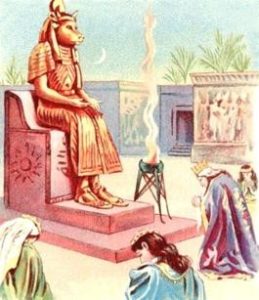 The northern kingdom became so identified with Omri during this period that, according to Assyrian records, it became known as “the land of Omri.”
The northern kingdom became so identified with Omri during this period that, according to Assyrian records, it became known as “the land of Omri.”
KING AHAB
The seventh king of Israel is Ahab, the son of Omri. He begins to reign in the 38th year of King Asa of Judah. Ahab does more evil than his predecessors. He takes Jezebel for his wife. She is a princess of the Sidonians, daughter of King Ethbaal, and an idol worshiper. Ahab follows her God, Baal, and builds altars to serve him. He also builds Asherah poles and encourages evil.
The great lesson in these chapters is to recognize the power of influence held by fathers. Children look to their fathers for guidance. They adopt their views and patterns of behavior. Unless the mind is renewed and the spirit released by the Word of God, families can continue in the sins of their ancestors and pay the consequences for many future generations.
Joshua had pronounced a curse on those who would rebuild the city of Jericho (Josh 6:26). It was the first city taken in the conquest of Canaan, and it was to be entirely dedicated to the Lord. No spoil was to be taken from it. Everything in it was put under the ban of His judgment except for Rahab and her family.
During his days, Hiel of Bethel rebuilt Jericho. He paid a heavy price. He laid the foundation at the cost of his firstborn, Abiram, and set up the gates at the cost of his youngest son, Segub. We don’t know how they died, but we know that the curse was fulfilled. We don’t know clearly if they died as child sacrifices or by some other means of the judgment of God. The practice of child sacrifice was common in the worship of Chemosh of Moab and Molech of Ammon (1 Kings 11:7). Child sacrifice possibly could have been introduced when Solomon built altars to these false deities.
Jericho, the first city taken in the Promised Land, was to remain in ruins as a testimony to the once and for all victory, that God provided as His people walked in faith. It was the “first fruit of victory” representing the conquest of Canaan to come. Sadly, the promise of victory has been ignored as the nation of Israel invites defeat through spiritual compromise and builds on ground that has been cursed.
THE STORY OF ELIJAH
 It is in this dark period of the history of Israel that the mighty prophet Elijah appears.
It is in this dark period of the history of Israel that the mighty prophet Elijah appears.
It would seem that at this time, every spiritual voice had been silenced, and every light had been extinguished.
58 years had transpired since the death of Solomon, and the kingdom divided into two. All the kings of Israel had put the Lord behind their backs.
We don’t know that much about Elijah’s early days. In a later chapter, there is one sentence that gives us a clear idea of his spiritual character:
1 Kings 19:10 (NASB) 10 He said, “I have been very zealous for the LORD, the God of hosts; for the sons of Israel have forsaken Your covenant, torn down Your altars and killed Your prophets with the sword.
In this zeal, he feels very alone. But he was motivated to see God glorified among His covenant people. The honor of His Name meant more to Elijah than anything else.
A.W. Pink describes the times in which Elijah ministered:
Idolatry had become the state religion: the worship of Baal was the order of the day: wickedness was rampant on every side. The enemy had indeed come in like a flood, and it looked as though there was no barrier left which could stem its devastating effects. Then it was that the Spirit of the Lord lifted up a standard against him, displeased with the sins of the people, and would now visit their iniquities upon them. That heavenly standard was raised aloft by the hand of Elijah.
Elijah proclaimed the name of the Lord while the apostate nation of Israel had adopted Baal as their god.
Rather than giving into hopelessness, Elijah dared to pray.
In the New Testament, James writes:
James 5:16b-18 (NASB). The effective prayer of a righteous man can accomplish much. 17 Elijah was a man with a nature like ours, and he prayed earnestly that it would not rain, and it did not rain on the earth for three years and six months. 18 Then he prayed again, and the sky poured rain and the earth produced its fruit.
He knew that he was weak, but God is almighty.
Moses and Elijah are in conversation with Jesus on the Mount of Transfiguration. Both are discussing ‘the departure’ that Jesus should accomplish in Jerusalem. Jesus was a fulfillment of the promise of a “prophet like unto Moses” who brings his people out of bondage as slaves to sin and death and into the full liberty of sons of God. Elijah is known for his departure in a chariot of fire. Elijah does seven miracles. After he ascends, his mantle falls on Elisha, a type of the church. Elisha does 14 miracles- twice the number of Elijah’s miracles. The church multiplies Jesus’ ministry of calling people to repentance and faith as we function as members of his body. Jesus told his disciples, “Greater works you shall do.” The greater works refer to the greater, more enduring work of proclaiming the finished work of redemption and seeing people delivered from spiritual death, coming alive to God and baptized by the Spirit into the body and eternal life of Christ.
We know little about Elijah’s early days or his family of origin. A. W. Pink comments:
We believe there is a typical reason why the spirit made no reference to Elijah’s origin. Like Melchizedek, the beginning and close of his history is shrouded in sacred mystery. As the absence of any mention of Melchizedek’s birth and death was Divinely designed to foreshadow the eternal Priesthood and Kingship of Christ, so the fact that we know nothing of Elijah’s father and mother, and the further fact that he was supernaturally translated from this world without passing through the portals of death, mark him as the typical forerunner of the everlasting Prophet. Thus the omission of such details adumbrated the endlessness of Christ’s prophetic office.
Unlike the kings of Israel, Elijah did what he was told by God.
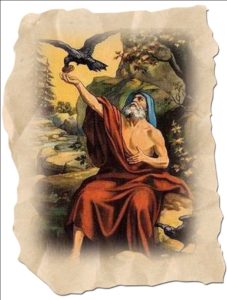 The Lord told him to hide himself by the brook Cherith. Elijah did so. The Lord told him that he would be fed there. Ravens gave him meat and bread two times a day. Elijah was fed twice a day, whereas the children of Israel were only fed once a day in the wilderness.
The Lord told him to hide himself by the brook Cherith. Elijah did so. The Lord told him that he would be fed there. Ravens gave him meat and bread two times a day. Elijah was fed twice a day, whereas the children of Israel were only fed once a day in the wilderness.
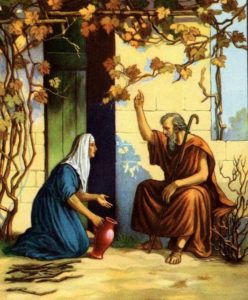 The word of the Lord came to Elijah in this time of famine, instructing him to go to a country outside of Israel, to Zarephath in Sidon, the heartland of Baal worship. There he would meet a starving widow who was willing to trust God. Elijah calls her to great steps of faith- to feed him and herself before she fed her starving son. She was called to offer up her little supply to a stranger. The Lord supernaturally provided that the flour and the jug of oil would not run out.
The word of the Lord came to Elijah in this time of famine, instructing him to go to a country outside of Israel, to Zarephath in Sidon, the heartland of Baal worship. There he would meet a starving widow who was willing to trust God. Elijah calls her to great steps of faith- to feed him and herself before she fed her starving son. She was called to offer up her little supply to a stranger. The Lord supernaturally provided that the flour and the jug of oil would not run out.
1 Kings 17:14 (NASB) 14 “For thus says the LORD God of Israel, ‘The bowl of flour shall not be exhausted, nor shall the jar of oil be empty, until the day that the LORD sends rain on the face of the earth.'”
The prophecy is fulfilled “according to the word of the Lord which He spoke through Elijah (1 Kings 17:16).
Like Jesus, Elijah multiplies the food supply. Also, like Jesus, he raises the dead.
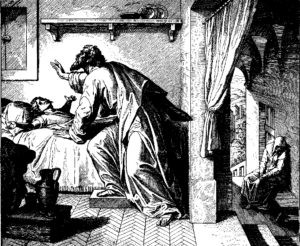 We see that he stretches out over the boy three times. It is a picture of the boy being identified with Christ in his death and resurrection. Obedience to the direction of the Holy Spirit is part of his prayer.
We see that he stretches out over the boy three times. It is a picture of the boy being identified with Christ in his death and resurrection. Obedience to the direction of the Holy Spirit is part of his prayer.
1 Kings 17:22 (NASB) 22 The LORD heard the voice of Elijah, and the life of the child returned to him and he revived.
This miracle produces faith in the widow from Zarephath, assuring her not only that “the Lord is God” (the meaning of Elijah’s name) but that Elijah was His man.
1 Kings 17:24 (NASB) 24 Then the woman said to Elijah, “Now I know that you are a man of God and that the word of the LORD in your mouth is truth.”
NEW TESTAMENT READING: Acts 10:24-48
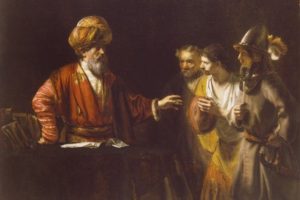 The Apostle Peter is being challenged to take the gospel to those who are outside of his particular Jewish culture. The vision he receives earlier in this chapter prepares him for this act of fresh obedience of going to the home of a Gentile, Cornelius, one who would have been considered unclean according to the laws of separation, in order to share the gospel of the Lord Jesus Christ.
The Apostle Peter is being challenged to take the gospel to those who are outside of his particular Jewish culture. The vision he receives earlier in this chapter prepares him for this act of fresh obedience of going to the home of a Gentile, Cornelius, one who would have been considered unclean according to the laws of separation, in order to share the gospel of the Lord Jesus Christ.
Cornelius is a God-fearing man. Peter shares with Cornelius what God has shown him. He is now to regard no one as unholy or unclean. All, including Gentiles, are within reach of the saving power of the gospel.
Do we raise an objection when we are sent to those whose lives and culture are beyond our comfort zone?
First, Cornelius tells his story. He has been prepared by the Spirit also and told to invite Simon to come to his house.
Then Peter preaches the gospel. The gospel of Christ appeals to all whose hearts have been prepared to welcome Him. It is a message of God’s work of reconciliation by which He provided peace through Jesus’ self-giving sacrifice. He shed His blood on the cross so, as God, He could justly pardon sinners. It is a message of Jesus’ authority and office as Lord of all, and the Judge before whom we all will have to give an account (Acts 10:36).
Peter’s message is instructive. He does not preach himself. He preaches Christ. He gives a summary of His impeccable life and ministry that qualifies Jesus to be the spotless lamb of God to take away the sin of the world:
“You know of Jesus of Nazareth, how God anointed Him with the Holy Spirit and with power, and how He went about doing good and healing all who were oppressed by the devil, for God was with Him. (Acts 10:38)
Then he preaches the gospel events– the cross- the death, burial, resurrection, and ascension of Jesus Christ.
“We are witnesses of all the things He did both in the land of the Jews and in Jerusalem. They also put Him to death by hanging Him on a cross, God raised Him up on the third day and granted that He become visible, not to all the people, but to witnesses who were chosen beforehand by God, that is, to us who ate and drank with Him after He arose from the dead.” (Acts 10:39-41)
Then He gives the gospel demand– to believe in Christ (thereby repenting of our own ability to put ourselves right before a holy God through any other means).
He concludes with the gospel promise: forgiveness of sins
“And He ordered us to preach to the people, and solemnly to testify that this is the One who has been appointed by God as Judge of the living and the dead. Of Him all the prophets bear witness that through His name everyone who believes in Him receives forgiveness of sins.”
The gospel results in regeneration, being born again and filled with the Spirit.
TODAY’S PSALM- PSALM 134
Psalm 134:1-3 (NASB) 1 Behold, bless the LORD, all servants of the LORD, who serve by night in the house of the LORD! 2 Lift up your hands to the sanctuary and bless the LORD. May 3 the LORD bless you from Zion, He who made heaven and earth.
Psalm 134 is the last of the 15 Songs of Ascents, sometimes called the Songs of Degrees, or the Songs of the Steps- as these were sung by pilgrims on their way up to the temple in Jerusalem.
We can imagine them arriving at their destination and singing this after ascending the three flights of stairs to the temple courts. Spiritually the Psalmist is in a higher place than he was when he started the first song in the series when he called out to the Lord from the low place of his distress in Psalm 120. In that first of the 15 Psalms, he cried out, “Woe to me, that I sojourn in Meshesh, that I dwell among the tents of Kedar, far off territories where they hate peace. He longs for the peace of Jerusalem, the city of peace. Now He is standing there and with a heart of satisfaction, blesses the Lord and calls all servants of the Lord to do so, even those who stand there in the darkness of night.
Notice the last line of Psalm 134. It is a benediction. May the Creator God who made heaven and earth bless you from Zion, that is, the Holiest of All, where the Atoning Blood of the Lamb is placed on the mercy seat to justify the guilty sinner and make peace. On the basis of the finished work of Jesus Christ, peace with God has been made, and as a result, the Lord commands a blessing, as we read yesterday, even ‘life forevermore’ (Psalm 133:3)
TODAY’S READING FROM PROVERBS- PROVERBS 17:9-11
9 He who conceals a transgression seeks love, but he who repeats a matter separates intimate friends. 10 A rebuke goes deeper into one who has understanding than a hundred blows into a fool. 11 A rebellious man seeks only evil, so a cruel messenger will be sent against him.
This is another warning from Scripture of the importance of discretion in speech and the danger of gossip. Verbal correction, speaking the truth in love, is better than beating a person down verbally, psychologically, or physically.
PRAY FOR THE NATIONS: (from “Operation World” Prayer Guide, p. 397-399)
Honduras
Latin America
Geography
Area: 112,088 sq km
A mountainous land with rain forests and fertile coastal plains on the Caribbean and Pacific coasts.
Population: 7,615,584 Annual Growth: 2.01%
Capital: Tegucigalpa
Urbanites: 48.8%
HDI Rank: 112 of 182 (UN Human Development Reports 2009)
Official language: Spanish. Other language is English on the northern coast Languages: 13
Religion
Largest Religion: Christian
|
Religion |
|
Pop % |
Ann Gr |
|
7,359,700 |
96.64 |
2.0 |
|
|
1,751,873 |
23.0 |
4.4 |
Challenges for Prayer
The government faces an uphill battle in establishing true stability and order. A young nation, Honduras’ colonial past and military rule for most of its independence mean that democratic structures and mentalities must be nurtured. Corruption within the government, preferential treatment of the rich minority and prevalent poverty make the nation vulnerable to structures of sin. Pray for righteousness and for wise and resolute governance.
Economy: One of the Western Hemisphere’s poorest countries, with most of the wealth in the hands of a very small minority.
Specialist Christian ministries. Pray for:
a) Student outreach by both CCCI and IFES. With a burgeoning young population, many churches are also taking up ministry to children and students.
b) Christian literature. Hosanna and Vida’s bookstores are important resources for Christian growth.
c) National radio gives time to several evangelical churches, and there are 41 local evangelical radio stations (such as HRVC, Stereo Luz and Cosecha) and two TV channels as well as Internet radio.
Children are at risk. More than half of Honduras’ population are children, the majority living in poverty. Destitution drives them to desperate measures.
- Illegal emigration. Thousands of children attempt to cross to the USA to find family members working there. Usually, they end up incarcerated in Guatemala or Mexico- in terrible conditions.
- Pepenadores, or garbage dump children, are more prevalent in Honduras than in any nation in the Americas.
- Street children, numbering in the thousands, are often exterminated as a nuisance by ruthless groups in the name of social cleansing.
- Powerful gangs, known as ‘maras’ are made up mostly of youth, but have massive influence and power in Honduras society. They are becoming more violent and ruthless and are linking up with drug cartels using Honduras as a transshipment point. The government is waging an increasingly intense war against these groups for whom kidnapping, extortion, and assault are the main activities
- The AIDS epidemic. Honduras is home to 60% of Central America’s AIDS cases. Poverty, ignorance, a widespread sex industry, a macho culture and the Catholic stance against contraception all contribute to its rapid growth. Pray for moral courage and an educational shift among Hondurans to halt the spread of AIDS.
New Life Community Church supports the Children’s Rescue Mission in Teupasenti, Honduras. Children’s Rescue Mission (CRM) was founded by Miguel Giron in 1999 in the aftermath of Hurricane Mitch. The first mission trip was made in 1999 and funded by a private $5,000 donation to provide medical aid to the children. The mission initially occupied a borrowed room in a local Teupasenti residence and served 12 children. Since then, it has grown into a school and ministry center that has made a real difference in the lives of the children and villagers of Teupasenti, bringing clean water, education, vocational training, jobs, but most importantly, the message of salvation by grace through faith in Christ.
PRAYER: Lord, we know that all Scripture is inspired by the Holy Spirit and is profitable for teaching, reproof, correction, and training in righteousness. We thank You that we can grow in the grace and the knowledge of Jesus Christ, our Lord, and Savior and that the Holy Spirit can teach us to avoid the pitfalls of the kings of Israel. Help us to be quick to say ‘no’ to ungodliness, worldly desires, and the idols that our hearts so easily manufacture. Give us discernment, so we do not compromise our obedience to Your Word! Help us to be faithful to preach the gospel events (the cross), promises (forgiveness, eternal life), witnesses (found in the Scriptures), and demands (repentance and faith)! In Jesus’ Name,
Pastor David
So, naturally, we proclaim Christ! We warn everyone we meet, and we teach everyone we can, all that we know about him, so that, if possible, we may bring every man up to his full maturity in Christ. (Colossians 1:28, J.B. Phillips paraphrase)
New Life Community Church, Concord, MA 10742
www.newlife.org

